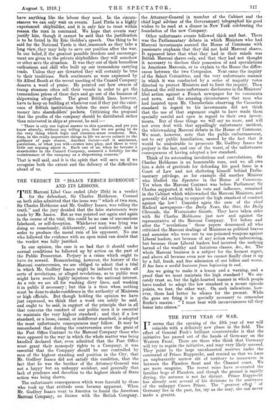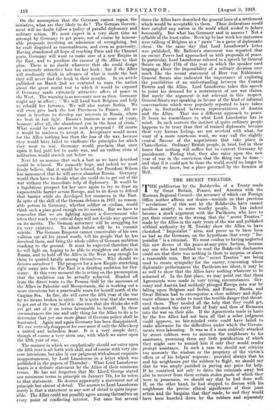.1.11N, FIFTH YEAR OF WAR.
IT seems that the opening of the fifth year of war will coincide with a definitely new phase in the field. The effect of General Foch's brilliant counterstroke is that the initiative has passed out of the hands of Germany on the Western Front. There are those who think that Germany will try to regain the initiative, and may very likely succeed. They point to the large unexhausted reserves under the command of Prince Rupprecht, and remind us that we have an unpleasantly narrow slit of territory to manoeuvre in between the Flanders front and the Channel coast. We are more sanguine. The recent rains have re-created the familiar bogs of Flanders, and though the ground is rapidly drying, the autumn is not far distant. Prince Rupprecht has already sent several of his divisions to the assistance of the unhappy Crown Prince. The " greatest effort " of Germany lies in the past, for, try as she may, she can never make a greater. On the assumption that the Germans cannot regain the initiative, what are they likely to do ? The German Govern- ment will no doubt follow a policy of parallel diplomacy and military action. We must expect in a very short time an attempt by Germany to get peace, not of course by honour- able proposals involving an admission of wrongdoing, but by craft disguised as reasonableness, and even as generosity. Having abandoned all hope of reaching Paris and the Channel ports, Germany will want to make sure of a new Empire in the East, and to purchase the consent of the Allies to that plan. There is no doubt whatever that she could design an extremely attractive bait for her hook ; but if the Allies will studiously think in advance of what is inside the bait they will never find the hook in their mouths. In an article published on March 2nd we ventured to warn the nation about the great moral test to which it would be exposed if Germany made extremely attractive offers of peace in the West. The warning is as necessary now as then. Germany might say in effect : " We will hand back Belgium and help to rebuild her fortunes. We will also restore Serbia. We will even give back the lost Provinces to France. All we want is freedom to develop our interests in Russia, whom we beat in fair fight. Russia's business is none of yours, because, after all, she abandoned you in the hour of crisis." What. would be the answer to such a proposal ? Of course it would be madness to accept it. Acceptance would mean for the Allies nothing less than the loss of the war, because they would have failed to vindicate the principles for which they went to war. Germany would proclaim that once again it had paid her to make war, and an endless vista of militarism would stretch out before us.
Next let us assume that such a bait as we have described would be refused. We earnestly hope, and indeed we most firmly believe, that it would be refused, for President Wilson has announced that he will never abandon Russia. Germany would then have to decide what she could do to get out of the war without the immediate help of diplomacy. It would be a lugubrious prospect for her once again to try to draw an impenetrable barrier across Europe, and to sit down to defend that barrier while she developed her resources in the East. In spite of the skill of the German defence in 1917, no reason- able person in Germany, whether soldier or civilian, would think such a plan good enough on its merits. But we have to remember that we are fighting against a Government who when they reach very critical days will not decide any question on its merits. The German autocracy will be struggling for its very existence. To admit failure will be to commit suicide. The German Emperor cannot conceivably of his own volition eat all his proud words, tell his people that he has deceived them, and bring the whole edifice of German ambition crashing to the ground. It must be expected therefore that he will fight on, hoping to be able to straighten out affairs in Russia, and to hold off the Allies in the West long enough for them to quarrel fatally among themselves. Why should we deceive ourselves ? The prospect for a new Empire stretching rig it away into the Far East is a dazzling ambition for Ger- many. At this very moment she is acting on the presumption that the ambition can be actually achieved. Headed off from the direct route to the Persian Gulf by the successes of the Allies in Palestine and Mesopotamia, she is working out a more circuitous but a practicable route for herself north of the Caspian Sea. In fine, she will enter the fifth year of the war by no means broken in spirit. It is quite true that she wants to get out of the war, but it is also true that she thinks she will yet get out of it on terms favourable to herself. In these circumstances the one and only thing for the Allies to do is to determine that yet one more phase of German policy shall be frustrated. Again and again Germany has been disappointed. We can certainly disappoint her once more if only the Allies keep a united and unbroken front. It is a very simple duty, though of course a very stern one, with which we enter upon the fifth year of war.
The manner in which we emphatically should not enter upon the fifth year is set forth with skill, and of course with very sin- cere intentions, but also in our judgment with almost exquisite inopportuneness, by Lord Lansdowne in a letter which was published in the papers of Thursday. What Lord Lansdowne wants is a definite statement by the Allies of their minimum terms. He has not forgotten that Mr. Lloyd George stated our minimum terms in principle on January 7th, for he refers to that statement. He desires apparently a statement not of principle but almost of detail. The answer to Lord Lansdowne surely Is that a statement in any sort of detail is quite impos- sible. The Allies could not possibly agree among themselves on every point of conflicting interest. Not once but several times the Allies have described the general lines of a settlement which would be acceptable to them. Those declarations would have satisfied any nation in the world which wished _to behave honourably. But what has Germany said in answer ? Not a syllable of the least value. Even up to last week her statesmen were talking of Belgium as a " pawn " in a game of diplomatic chess. On the same day that Lord Lansdowne's letter was published, Mr. Balfour's statement was reported that no enemy Power had approached us with proposals of peace. In particular, Lord Lansdowne referred to a speech by General Smuts on May 17th of this year in which the speaker used language about the impossibility of a military decision very much like the recent statement of Herr von Kuhlmann. General Smuts also indicated the importance of exploring the possibilities of an understanding between the Central Powers and the Allies. Lord Lansdowne takes this speech to point his demand for a restatement of our war claims. But surely the argument is not relevant in this respect. General Smuts was speaking in favour of the kind of informal conversations which were popularly reported to have taken place in Switzerland between .representatives of Austria and the Allies. That was a different approach to peace. It bears no resemblance to what Lord Lansdowne has in mind. In such matters the instinct of quite ordinary people happens to be truer than that of trained diplomats, because their very human feelings are not overlaid with what, for want of a more courteous word, we may call the slightly cynical flavour of the negotiations that take place in Chancelleries. Ordinary British people, in brief, feel in their bones that nothing will suffice but to convert Germany by punishment. Feeling that, they also enter upon the new year of war in the conviction that the thing can be done—: and that if it could not be done the world would no longer be the world we know, but a place governed by the frenzies of Hell.



























 Previous page
Previous page